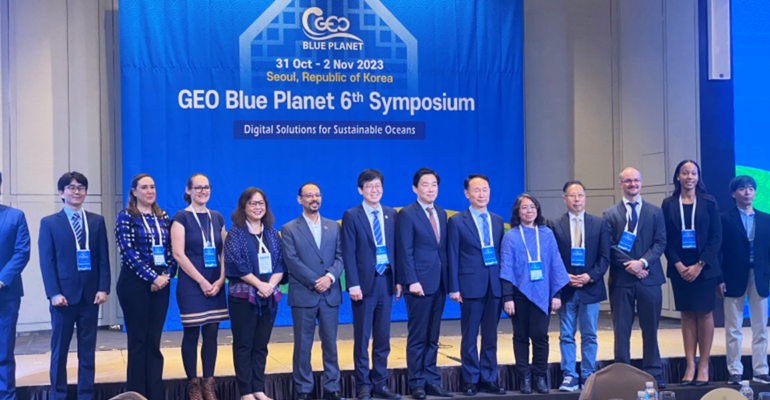PKSPL IPB University representing Indonesia, attended the Geo Blue Planet Symposium

The Center for Coastal and Marine Resources Studies (CCMRS), known as Pusat Kajian Sumberdaya Pesisir dan Lautan (PKSPL) at IPB University, represented Indonesia at the Geo Blue Planet 6th Symposium held at The Ambassador Seoul A Pullman Hotel in South Korea (31/10-2/11). The symposium’s theme was “Digital Solutions for Sustainable Oceans.”
PKSPL IPB University serving as the Partnerships in Environmental Management for the Seas of East Asia (PEMSEA) Network Learning Center (PNLC), was invited to participate in the event. The presence of PKSPL from IPB University was part of the representation of coastal and marine research institutions in Indonesia. Present at the forum were Prof Yonvitner, the Chairman of PKSPL and President of PNLC, along with Isdahartati, MSi, as a researcher.
“This activity serves as a window for IPB University to connect with the global community on global coastal and marine issues,” said Prof Yonvitner, who is also a Professor at the Department of Aquatic Resource Management (MSP), Faculty of Fisheries and Marine Science at IPB University.
In his speech, Sung-Jin Cho, the Secretariat of Geo Blue Planet Asia, outlined that the symposium’s purpose was to enhance regional and international relations and promote the connection between stakeholders and observers of Geo Blue Planet.
“This event also aims to obtain feedback from participants focusing on Geo Blue Planet,” said Sung-Jin Cho, who is also a researcher at the Korea Maritime Institute (KMI).
Kim Jong Deong, the President of KMI, stated that there were three main agendas at the symposium. Firstly, the GEO Blue Planet Session, one of its aims being to promote and discuss coastal and ocean issues in the Asian region.
“The second agenda is the Digital Solution Session, which aims to address global marine issues such as climate change, marine debris, dead zones, loss of marine biodiversity, illegal fishing, and overfishing,” he added.
He continued that the third agenda was the Symposium Forum, with the primary goal of exploring critical regional issues related to marine spatial utilization and coordinating strategies with the Geo Blue Planet working group in Asia.
The symposium also included side events that discussed current issues related to sustainable coastal and marine areas. “The side event aims to enhance understanding of marine space issues and facilitate dialogue to encourage collaboration among various stakeholders,” said Kim Jong Deong. (ISD/Rz) (IAAS/Hap)



